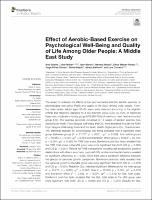Por favor, use este identificador para citar o enlazar este ítem:
https://repositorio.usj.es/handle/123456789/785
Registro completo de metadatos
| Campo DC | Valor | Lengua/Idioma |
|---|---|---|
| dc.contributor.author | Shams, Amir | - |
| dc.contributor.author | Nobari, Hadi | - |
| dc.contributor.author | Afonso, José | - |
| dc.contributor.author | Abbasi, Hamed | - |
| dc.contributor.author | Mainer Pardos, Elena | - |
| dc.contributor.author | Perez-Gomez, Jorge | - |
| dc.contributor.author | Bayati, M. | - |
| dc.contributor.author | Bahrami, Alireza | - |
| dc.contributor.author | Carneiro, Lara | - |
| dc.date.accessioned | 2022-06-02T09:49:46Z | - |
| dc.date.available | 2022-06-02T09:49:46Z | - |
| dc.date.issued | 2021-12-06 | - |
| dc.identifier.citation | Shams A, Nobari H, Afonso J, Abbasi H, Mainer-Pardos E, Pérez-Gómez J, Bayati M, Bahrami A and Carneiro L (2021) Effect of Aerobic-Based Exercise on Psychological Well-Being and Quality of Life Among Older People: A Middle East Study. Front. Public Health 9:764044. doi: 10.3389/fpubh.2021.764044 | es_ES |
| dc.identifier.issn | 2296-2565 | es_ES |
| dc.identifier.uri | https://repositorio.usj.es/handle/123456789/785 | - |
| dc.description.abstract | The aimed to evaluate the effects of low and moderate-intensity aerobic exercise on psychological well-being (PWB) and quality of life (QoL) among older people. Forty-five male Iranian adults aged 65-80 years were selected according to the eligibility criteria and randomly assigned to a low-intensity group (LIG) (40-50% of maximum heart rate), moderate-intensity group (MIG) (60-70% of maximum heart rate) and control group (CG). The exercise protocols consisted of 12 weeks of aerobic exercise (two sessions per week). Psychological well-being and QoL were assessed through the Ryff's Psychological Well-being Scale and the World Health Organization QoL Questionnaire. The statistical analysis for psychological well-being indicated that a significant main group (between-group) (F = 11.777, p < 0.001, eta p(2) = 0.359), time (within-group) (F = 58.983, p < 0.001, eta p(2) = 0.584) and interaction effect (group x time) (F = 20.146, p < 0.001, eta p(2) = 0.490) for PWB total score. Bonferroni post-hoc tests revealed that the PWB total score in the MIG group was more significant than both LIG (p = 0.003) and CG (p < 0.001). Results for PWB components including self-acceptance, positive relationships with others, autonomy, purposeful life, and environmental mastery revealed no significant differences (p > 0.05). While there was a significant difference between the groups for personal growth component. Bonferroni post-hoc tests revealed that the personal growth in the MIG group was more significant than both LIG (p = 0.028) and CG (p < 0.001). Result for QoL indicated significant differences for the main group (F = 13.277, p < 0.001, eta p(2) = 0.387), time (F = 25.533, p < 0.001, eta p(2) = 0.378) and interaction effect (F = 9.992, p < 0.001, eta p(2) = 0.332) for QoL total scale. Bonferroni post-hoc tests revealed that the QoL total scale in the MIG group was more significant than both LIG (p = 0.003) and CG (p < 0.001). Results for QoL components including Physical health, Social relationships, Health environment revealed no significant differences (p > 0.05), while there was a significant difference between the groups for the Psychological health component. Bonferroni post-hoc tests revealed that the Psychological health in the MIG group was more significant than both LIG (p = 0.009) and CG (p = 0.002). Therefore, aerobic exercise improves PWB and QoL in older adults, moderate-intensity exercise seems to produce higher benefits than low-intensity, demonstrating a positive dose-response relationship. | es_ES |
| dc.format.extent | 10 p. | es_ES |
| dc.format.mimetype | application/pdf | es_ES |
| dc.language.iso | eng | es_ES |
| dc.publisher | FRONTIERS MEDIA SA | es_ES |
| dc.relation | This research was conducted with support of WHO/EMRO as source of funding as RPPH Grant 18-92 | es_ES |
| dc.rights | Atribución 4.0 Internacional | * |
| dc.rights.uri | http://creativecommons.org/licenses/by/4.0/ | * |
| dc.subject | Cardiovascular fitness | es_ES |
| dc.subject | Mental health | es_ES |
| dc.subject | Old people | es_ES |
| dc.subject | Physical fitness | es_ES |
| dc.subject | Dose-response | es_ES |
| dc.title | Effect of Aerobic-Based Exercise on Psychological Well-Being and Quality of Life Among Older People: A Middle East Study | es_ES |
| dc.type | info:eu-repo/semantics/article | es_ES |
| dc.identifier.doi | 10.3389/fpubh.2021.764044 | es_ES |
| dc.rights.accessrights | info:eu-repo/semantics/openAccess | es_ES |
| Aparece en las colecciones: | Artículos de revistas | |
Ficheros en este ítem:
| Fichero | Descripción | Tamaño | Formato | |
|---|---|---|---|---|
| Effect of Aerobic-Based Exercise on Psychological Well-Being and Quality of Life Among Older People.pdf | 581,2 kB | Adobe PDF |  Visualizar/Abrir |
Este ítem está sujeto a una licencia Creative Commons Licencia Creative Commons

